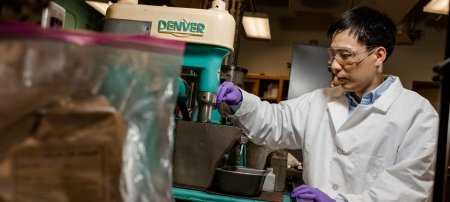Michigan Tech Students Build a CO2 Scrubber

Komar Kawatra couldn’t be prouder of the students on his research team. “We have developed
a CO2 scrubber,” he says. “It was designed at Michigan Tech and built at Michigan Tech
by Michigan Tech students.”
Kawatra, who chairs the chemical engineering department, has reason to be gratified
by his proteges’ efforts. An 11-foot bench-model smokestack packed with glass beads
is percolating away in a lab. Near the top, a proprietary liquid dribbles down. From
below, carbon dioxide bubbles up. By the time the gas reaches the top, fully half
of the CO2 has been gobbled up by the liquid.
The process not only captures carbon, it binds it in a solid form, making an undisclosed product that can be used as a construction material. The liquid itself can be recovered and used again. The group has applied for a patent and hopes to build a pilot plant in cooperation with an industry partner, Carbontec Energy Corp.
Other scrubbers remove up to 90 percent of the carbon dioxide from a smokestack, Kawatra notes, but the liquid must be processed to strip away the carbon dioxide, which is generally compressed and stored. “This is a very expensive technique, which is probably why we do not see it commonly employed in industry,” says PhD student Brett Spigarelli of Iron Mountain, a member of the research team.
The group is working to make the scrubber remove even more carbon dioxide. In the meantime, it offers a significant benefit to industry.
"Industry has a problem with CO2 capture and sequestration because it is an added cost with no direct benefit to them,” Kawatra says. “But, if it is possible for industry to both capture CO2 and produce a product from the CO2 that they can sell, then they will be much more interested. Our goal is therefore to not only capture the CO2 at the lowest possible cost, but also to manufacture useful, marketable products.”
Building the scrubber has been as much about education as research. In the beginning, Kawatra notes, the scrubber only removed 5 percent of the CO2, and the students were stymied. Then they had their first aha experience—and replaced their opaque pipe with clear plastic so they could see what was actually going on inside.
“You think research is going to be really complex and difficult,” says Spigarelli. “Sometimes, it’s just a matter of looking at things a little differently.”
That small step led to big breakthroughs and, ultimately, to professional recognition. Their poster received second-place honors among the student entries at the 2010 American Institute of Chemical Engineers National Meeting, held in Salt Lake City.
The team included five chemical engineering undergraduates, Janelle Paddock, Paul Hagadone, Alison Springer-Wilson, Aliabbas Sherally and Russ Jungnitsch. Involving undergraduates in research does much more than prepare them for careers in academia, says Spigarelli. Research brings classroom lessons to life. “The sooner students can get familiar with these processes, the better prepared they are for the workplace.”
Kawatra’s graduate team members are Justin and Josh Carlson of Escanaba, Joe Halt of Calumet and Urvashi Srivastava of India.
“I have four Yoopers working for me,” Kawatra says, smiling broadly. “We’re one family, and it’s a lot of fun to work with them.”
Michigan Technological University is an R1 public research university founded in 1885 in Houghton, and is home to nearly 7,500 students from more than 60 countries around the world. Consistently ranked among the best universities in the country for return on investment, Michigan's flagship technological university offers more than 120 undergraduate and graduate degree programs in science and technology, engineering, computing, forestry, business, health professions, humanities, mathematics, social sciences, and the arts. The rural campus is situated just miles from Lake Superior in Michigan's Upper Peninsula, offering year-round opportunities for outdoor adventure.




Comments